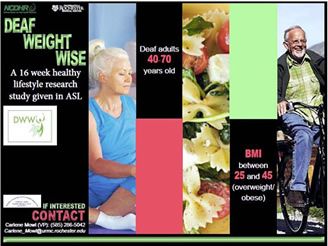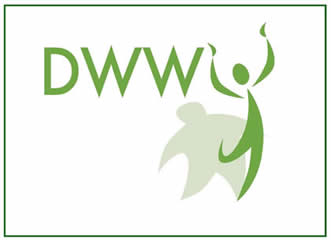Deaf Weight Wise
An Update on Deaf Weight Wise
The Deaf Weight Wise (DWW) research program successfully enrolled 104 participants! The RPRC:NCDHR research team would like to thank everyone who participated in DWW. Your interest and motivation has helped us learn more about the DWW 16-week healthy lifestyle group program. The RPRC:NCDHR team would also like to thank all the community organizations and clubs around Rochester that helped to support DWW recruitment events. We are thankful that you helped us spread the word about this important research.
RPRC:NCDHR is currently sharing the results with the Rochester Deaf community through our Town Hall Meetings. Stay tuned for more Town Hall Meeting dates. We look forward to your participation in these community meetings to help the RPRC:NCDHR research team understand how the results of DWW will impact the Deaf community. Stay tuned!
Read about the most recent Town Hall Meeting discussion on the DWW 16 week healthy lifestyle program results.
General Information

Deaf Weight Wise was one of the core research projects occurring in RPRC:NCDHR. The overall goal of the DWW research study was to establish the effectiveness of an intervention to reduce weight gain and obesity in Deaf people who use American Sign Language (ASL) as their primary language.
In the fall of 2011, RPRC:NCDHR began testing whether an evidence-based program would be effective in changing obesity-related health behaviors in Deaf adults aged 40-70. Deaf Weight Wise was adapted from the Weight-Wise Program, developed by the University of North Carolina at Chapel Hill, another CDC Prevention Research Center (PRC).
All phases of this study were carried out through active partnership with the Rochester Deaf Community. To our knowledge, this was the first randomized control trial of a healthy lifestyle intervention to be conducted in a Deaf population.
Study Design
Participants in the DWW research study were randomly assigned 1 of 2 intervention groups. The first group received the intervention in Spring 2012, and the second group received the intervention in Spring 2013. The intervention was a 16-week healthy lifestyle program. Each week for 16 weeks, participants attended group meetings with 10-12 other deaf people. They learned about healthy living, healthy food choices and cooking, and fun ways to be physically active. All groups were led by a deaf counselor. Counselors emphasized daily self-monitoring of food intake, number of fruit and vegetable servings, calorie intake, and minutes of physical activity. Participants were also asked to visit RPRC:NCDHR 5 times to take ASL health surveys and have physical measurements taken (height, weight, blood pressure, blood sample, etc).
Methods
Research methods and materials were developed to collect accurate and culturally appropriate health information from research participants. The Weight-Wise Program developed by the North Carolina PRC Program was translated and adapted for use with Deaf people in the DWW research study. Deaf participants were recruited and provided informed consent for participation in this clinical trial.
Data Collection
Health information including diet, physical activity, and heath behaviors were collected using sign language-video surveys, like the Deaf Health Survey. This information was collected at baseline/enrollment, 6 months, 12 months, and 18 months, and 24 months. Study data was analyzed to test hypotheses. Community members are being involved in the data interpretation process.
Historically, Deaf populations have had very limited access to health research opportunities like Deaf Weight Wise. Culturally appropriate intervention tools are being developed and implemented for dissemination, and substantially more information on health behaviors will be available to improve the health of Deaf people and their families.
Links
UNC Center for Health Promotion and Disease Prevention: http://www.hpdp.unc.edu/
Weight-Wise Program (UNC of Chapel Hill)
Publications
Pollard RQ, Dean RK, O'Hearn A, Haynes SL. Adapting health education materials for deaf audiences (Pub Med Citation). Rehabilitation Psychology 2009; 54(2): 232-238.
Barnett, S., Matthews, K., DeWindt, L., Sutter, E., Samuel-Hodge, C., Yang, H., & Pearson, T. A. (2023). Deaf Weight Wise: A novel randomized clinical trial with Deaf sign language users Obesity (Silver Spring, Md.), 31(4), 965–976.
Presentations
Barnett S, Sutter E, Pearson TA. The Deaf Weight Wise study: A unique clinical trial of health behavior modifications with deaf adults. Presented at the American Heart Association: Cardiovascular Disease, Epidemiology, and Prevention: Nutrition, Physical Activity, Metabolism Annual Meeting, San Francisco, CA; 2014
DeWindt L, O'Hearn A, Sutter E, Barnett S. Community and multidisciplinary collaboration to develop an accessible clinical trial of a behavioral health intervention with deaf adults: The Deaf Weight Wise study. Presented at the ADARA: American Deafness and Rehabilitation Association; 2014
O'Hearn A, Sutter E, DeWindt L . An American sign language consent film (Abstract). Presented at the APHA Film Festival, APHA 141th Annual Meeting, Boston, MA; 2013, Nov 6.
Sutter E, O'Hearn A, DeWindt L, Mowl C, Kelstone K, Barnett S, Pearson TA. Adapting informed consent processes with deaf American sign language (ASL) users: Experiences from the Deaf Weight Wise study (Abstract). Presented at the APHA Film Festival, APHA 141th Annual Meeting, Boston, MA; 2013, Nov 4.
Barnett S, Sutter E, O'Hearn A, DeWindt L, Mowl C, Kelstone K, Pollard R, Pearson TA. Responding to community feedback on research methods: Adapting informed consent processes with Deaf American Sign Language (ASL) users. Presented at the Science of Community Engaged Research: Future Directions 6th Annual Clinical and Translational Science Award (CTSA) National Conference, Bethesda, MD; 2013 Aug 22-23.
Barnett S, Dozier A, Adekunle H, Bennett N, Pearson TA. Community engagement and collaboration among federally funded programs: Working across the CTSA, Prevention Research Center, and Community Transformation Grant. Presented at the Science of Community Engaged Research: Future Directions 6th Annual Clinical and Translational Science Award (CTSA) National Conference, Bethesda, MD; 2013 Aug 22-23.
Barnett S, Sutter E, Winters P, Mowl C, McKee M, Smith S, Pearson TA. Undiagnosed diabetes and adults deaf since birth or early childhood. Presented at the Early Hearing Detection and Intervention (EHDI) 12th Annual Meeting, Phoenix, AZ; 2013 April 14-16
Lowenstein L, DeWindt L, Sutter E, Barnett S, Pearson TA. Community engagement necessary for recruitment into a novel randomized controlled lifestyle intervention trial with deaf adults. Presented at the American Heart Association EPINPAM Annual Meeting, New Orleans, LA; 2013.
Mowl C, O'Hearn A, Panko T, Sutter E, and Barnett S. Collecting research data from deaf ASL users: How do we know we're asking the right questions? (Abstract) Presented at the APHA 139th Annual Meeting, Washington DC; 2011, November 2.
Thew D, Starr M, DeAndrea-Lazarus I, Gahagan K, Evanstad C, Kushalnagar P, and Chin N. Tailoring a healthy living intervention to deaf adults: Sociocultural data from the target group. (Abstract) Presented at the APHA 139th Annual Meeting, Washington DC; 2011, October 31.
Panko T, Starr M. Using video blogs as a community engagement tool to overcome research knowledge gaps in deaf communities (Abstract). Presented at the APHA 139th Annual Meeting, Washington DC; 2011, October 31.
Mowl C, Panko T, Kelstone K, Barnett S, Pearson T, and the Research Committee of the National Center for Deaf Health Research (2011). Design of Deaf Weight Wise: A healthy lifestyle intervention for Deaf adults. CDC Prevention Research Centers Program Annual Conference, Atlanta (April 12 & 13)
Reid JT, Starr MJ, Barnett S (2011). Adapting public heath interventions for use with a new community: Experiences working with deaf adult sign language users. CDC Prevention Research Centers Program Annual Conference, Atlanta (April 13)
Obesity and Your Health: The Deaf Weight-Wise Research Study (Slides)

